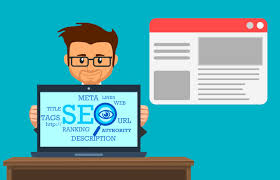What is SEO?
SEO, search engine optimisation, search engine optimization and organic search are just some of the terms used to describe this marketing channel, but what does it actually mean? Our latest blog covers the basics, so the next time your on a call with your agency, you know exactly what the terminology means!
Ultimately SEO is the name given to any activity or work with the goal of improving your website or apps rankings in the SERP’s (search engine results pages). This can be done in a number of ways, with strategies and tactics loosely falling under either on-page or off-page optimisation.
On-page search engine optimisation
On-page SEO covers elements directly related to your website and changes you can make on it, you may have heard of some of the following:
Keyword research –the process of finding relevant keywords for a business, knowing the monthly search volumes for these keywords and deciding the best ones to target on a website.
Page titles – Page titles are an important SEO ranking factor and are also an advert for your business. They are shown on SERP’s and need to describe the web page accurately along with including relevant keywords were possible.
Meta descriptions – Shown directly below a page title on SERP’s, meta descriptions should describe the page content in more detail and should include a call to action message to encourage website visitors.
Page content – ‘Content is king’ was a popular SEO saying for years and is still highly relevant today. Google index websites using bots that crawl a website. These bots are looking for content so it’s vital that your page includes a decent amount of it and that this content includes the keywords you are hoping to increase your ranking for.
Internal linking – Internal linking refers to the process of including links to other sections of your website, within your page copy. Once the Google bots reach your website they will start to crawl it. Internal linking and a good navigation structure will help to ensure they index more of your website which will mean more pages have the opportunity to rank and deliver you traffic!
Sitemap – A sitemap lists all of the pages on your website. A correctly formatted sitemap is important as it can be submitted directly to Google and Bing, helping you to be indexed quicker and more effectively.
Robots.txt file – A robots.txt file is used to tell any bots indexing your website what to look for and what to ignore. An example of this is you may want to exclude a bot from indexing pages from your website that are for logged in users only.
Alt tags – Alt tags are used to name images within a website code. Alt tags can be used to benefit a website in terms of SEO by naming images using keywords you want to rank for.
Site speed – Site speed is also an important on-page factor. Google like to provide their users with the best possible experience and a slow website doesn’t do that, so rankings will suffer if speeds aren’t improved.
Off-page optimisation
Off-page SEO covers tactics that don’t happen directly within your website. Some of the following terms may be familiar and play an important part in ensuring your website ranks for your target keywords.
Link building – Link building is the process of creating trust in a search engines eyes by ensuring your website is seen as an authority on your target industry through the process of getting other websites to link to yours. There are numerous ways to ensure good quality links are gained on a regular basis and the rewards in rankings that follow are well worth your time and effort.
Guest posts – One way to gain links is to provide content to another website that they can use on their site with a link back to your website. If the other website is relevant to yours then you have the bonus of potentially driving relevant traffic to your site, as well as the SEO benefit it will give.
We’ve covered just some of the basic terminology used in the SEO world in this article and hope it helps you gain a better understanding of this often mysterious channel. If you would like any further advice then please Get In Touch with us today. and we’ll be happy to help.

